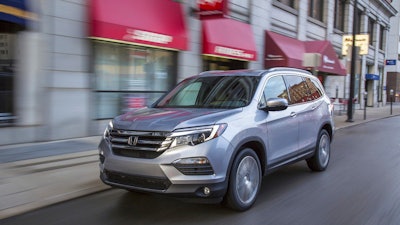
NEW YORK (AP) — The federal government can't delay plans to more than double penalties automakers pay when they fail to meet fuel economy standards, an appeals court said on Monday in siding with five states.
The 2nd U.S. Circuit Court of Appeals in Manhattan agreed with a lawsuit brought last year by California, Maryland, New York, Pennsylvania, Vermont and environmental groups, which were seeking to have a new rule about penalties enforced. The court said a written opinion explaining its reasoning would be issued later.
The Department of Justice did not immediately comment.
Different classes of vehicles must achieve certain miles-per-gallon standards, which initially were aimed at reducing the nation's oil consumption. Manufacturers of vehicles that fall below their minimum standards are penalized.
The new rule, which was set to take effect in July, would require automakers to pay $14 for every tenth of a mile (0.16 kilometers) per gallon (0.8 imperial gallons) of fuel a vehicle consumes over its minimum. Since the mid-1970s, automakers have paid $5.50 for every tenth of a mile per gallon.
Automakers objected, saying it would cost them $1 billion per year. The National Highway Traffic Safety Administration delayed the rule, saying it didn't adequately consider the cost to automakers.
The states said the delay was illegal because the federal government did not give proper notice and obtain public comment. They said the delay violated Congress's 2015 directive to update penalties by August 2016 to adjust for inflation. They said inflation meant the civil penalty was now less than a quarter of its original value.
In a release, New York Attorney General Eric T. Schneiderman said the ruling means the federal government no longer can delay implementation of higher penalties that will reduce carbon emissions and save consumers on average $1,650 annually in fuel costs.
But a government attorney warned a three-judge appeals panel during oral arguments earlier this month that letting the higher penalties go forward could be a short-lived victory for the states.
"It wouldn't much matter," Justice Department attorney H. Thomas Byron III told Circuit Judge Rosemary Pooler.
Byron said the U.S. Department of Transportation has issued an order that the lower rate will remain in effect while it reconsiders the 2016 decision to raise the rate. He said he expects a decision will be made by the end of the year on the penalty rate that will be charged on 2019 models.
Pooler noted that car makers are making decisions now about the technology they will put into cars in the future.
"We're racing against the clock," Pooler said.
An attorney with Schneiderman's office, Steven Wu, said at the 2nd Circuit hearing that the penalty rate had gotten so inexpensive as a result of inflation that car makers now considered it part of the cost of doing business.
On Monday, Schneiderman, a Democrat, called the court order "a big win for New Yorkers' and all Americans' health and environment," and he blamed President Donald Trump's administration for trying to delay the inflation adjustment.
"As we've proven again and again, when the Trump administration puts special interests before public health and our environment, we'll take them to court — and we will win," Schneiderman said.






















